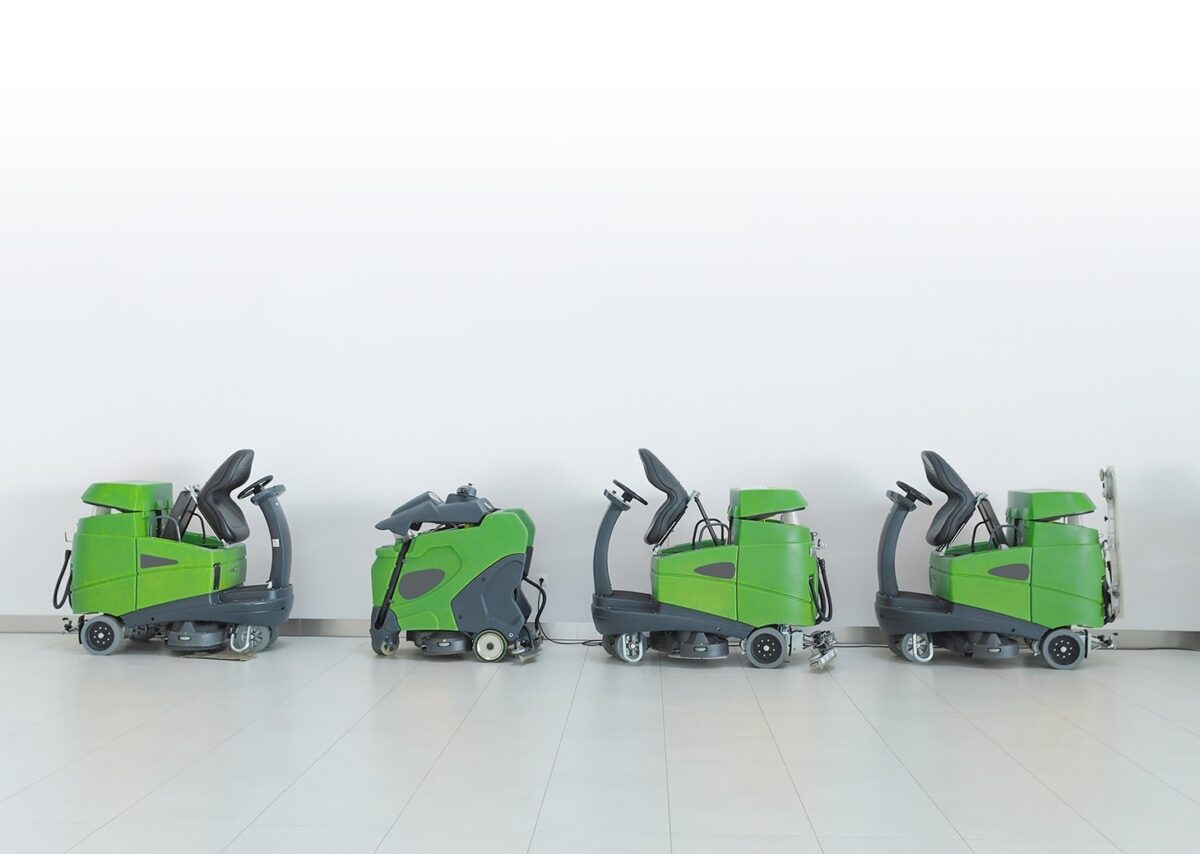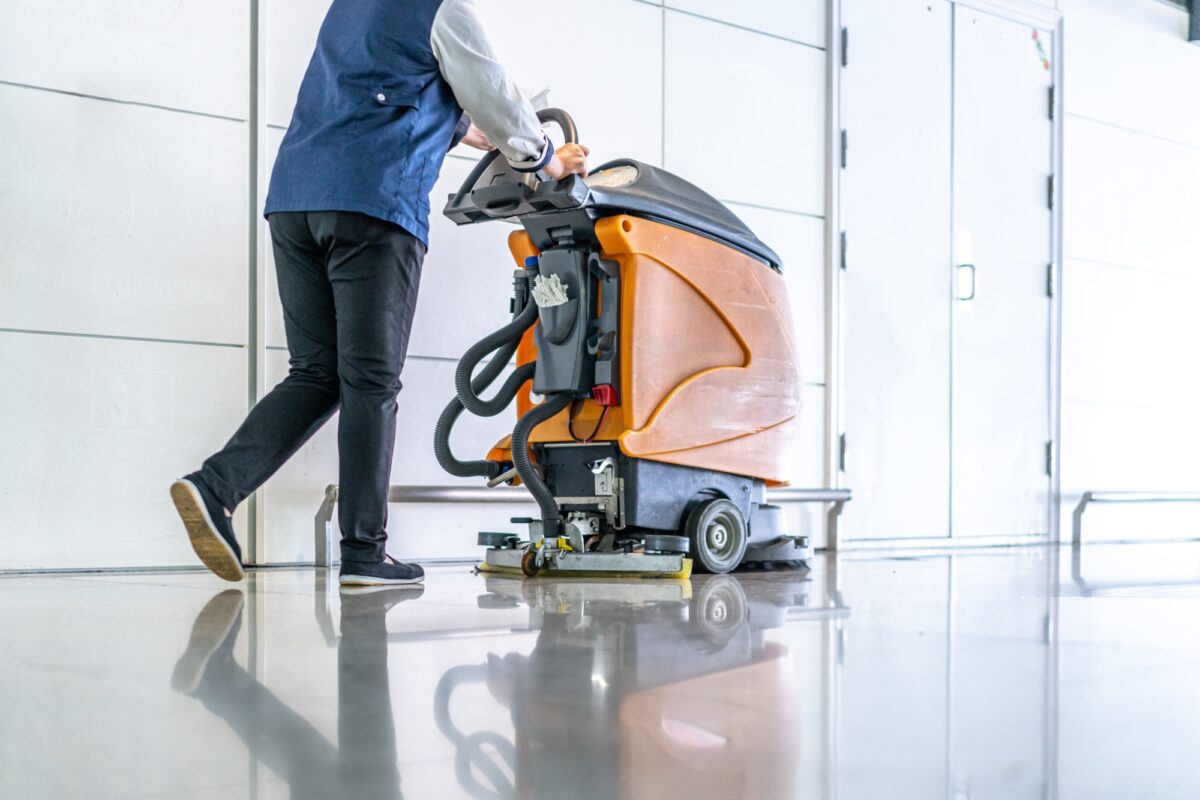Lithium batteries are making their way into the Floor Cleaning market and for good reason. If you look at all of the benefits, they are hands-down the best solution to power your floor cleaning machines.
Here are the benefits deep cycle lithium batteries can have on your floor cleaning machine:
- longer battery life
- more productivity
- more power
- zero maintenance
- rugged and built to last
- safer technology
- cost-effective
Longer Battery Life
Probably the most well-known and obvious benefit is a significantly longer life. Lithium iron phosphate (LiFePO4) batteries will provide 5 – 10 times more cycles than lead-acid batteries. This means you aren’t replacing your batteries every 2-4 years. And, replacing lead-acid batteries is not a fun task; first, there is downtime to do the battery replacement, then there is the heavy lifting to remove old batteries and install new batteries. Finally, there is the disposal of the spent batteries.
More Productivity
Another major benefit is the runtime or range. There are a few reasons LiFePO4 batteries can, and do, provide increased runtime over lead-acid batteries. The main reason is that a lithium battery provides the full rated capacity, regardless of the rate of discharge. Lead-acid batteries are typically rated at the 5-hour or 20-hour rate, which are based on constant current, laboratory-tested, and low rates of discharge. For example, a 200Ah (based on the 20-hr rate) lead-acid battery will provide 200Ah if it is run at a constant current of 10A for 20 hours. However, that same battery may provide only 135Ah if it is run at a constant current of 75A for 1.8 hours. With lead-acid batteries, as the rate of discharge increases, not only does the runtime decrease but the overall size of the fuel tank decreases. In a real application, the current is never constant, in fact, it varies continuously and often significantly. It is unpredictable. So with a lead-acid battery, you are never really getting the published battery capacity, in a floor machine. With a lithium iron phosphate battery, the fuel tank remains the same size regardless of the state of discharge. A 200Ah battery will provide 200Ah whether it is discharged at 10A or 100A. The battery will always deliver its published capacity.
Another reason LiFePO4 batteries provide more runtime than lead-acid batteries is the capacity degradation over the life of the battery is slow and minimal. Traditional wet lead-acid batteries typically provide around 80% capacity when brand new. They work up to their full capacity and remain there for a couple of hundred cycles and then decline over the next couple hundred cycles. AGM or Gel lead-acid batteries will provide their full capacity when brand new and steadily decline right away. Some Gel batteries will maintain their full capacity for a few hundred cycles but then rapidly decline.
Lithium iron phosphate batteries provide full rated capacity immediately and continue to do so for about 1000 cycles, with a slow decline to 80-90% capacity between 1000 to 2000 cycles. Lithium batteries charge quickly and can be opportunely charged without damaging the battery. This can significantly extend the range of your LiFePO4 battery per shift. Increased runtime, means increased productivity!
More Power
Lead-acid batteries provide full power for a relatively short period of time because the voltage declines steeply during usage. Lithium iron phosphate batteries provide full power throughout usage. This means, your floor cleaning equipment has full power throughout its shift.

Zero Maintenance
How convenient are lithium batteries? Very. No maintenance, no adding water, no cleaning acid residue from cables, connections, battery tops, and equipment. No replacements, or at least not for many years, and easy installation due to being incredibly light compared to lead-acid batteries.
Rugged and Built To Last
Lithium iron phosphate batteries are difficult to damage. They can’t be over-charged because the Battery Management System protects against that. Unlike lead-acid batteries, if they are under-charged or left in a partial state of charge, they will not be damaged. Check out our Tech Tuesday Part 1 and part 2 to learn more about this.
LFP Batteries Offer Safer Technology
Lithium iron phosphate batteries are safe. Not all lithium chemistries are the same. LiFePO4 is a much safer chemistry than other lithium-ion batteries. They produce a fraction of the heat generated by other lithium chemistries, due to their structural stability. Not to mention, they eliminate exposure to harmful gases that are continuously vented from lead-acid batteries.
Cost-Effectiveness
Lithium iron phosphate batteries offer great savings compared to lead-acid, between 20-50%, when you consider the total cost of ownership. Although the upfront cost of lithium is higher, the areas of saving are numerous. Reduced maintenance, battery replacement, labor, and charging costs all add up to substantial savings. The lifetime cost is less than lead-acid and we've done the math to prove it!
Do you have questions about RELiON lithium batteries for floor machines? Contact us and one of our tech experts will be in touch.
About the Author:

Christine Feodorov is the VP of Product Management & Strategy at RELiON Battery. With over 23 years of experience with deep-cycle batteries, including flooded lead-acid and AGM, as well as lithium, Christine is an engineer with experience in battery testing, product development and management, and technical support. Keep up with Christine on LinkedIn here.
